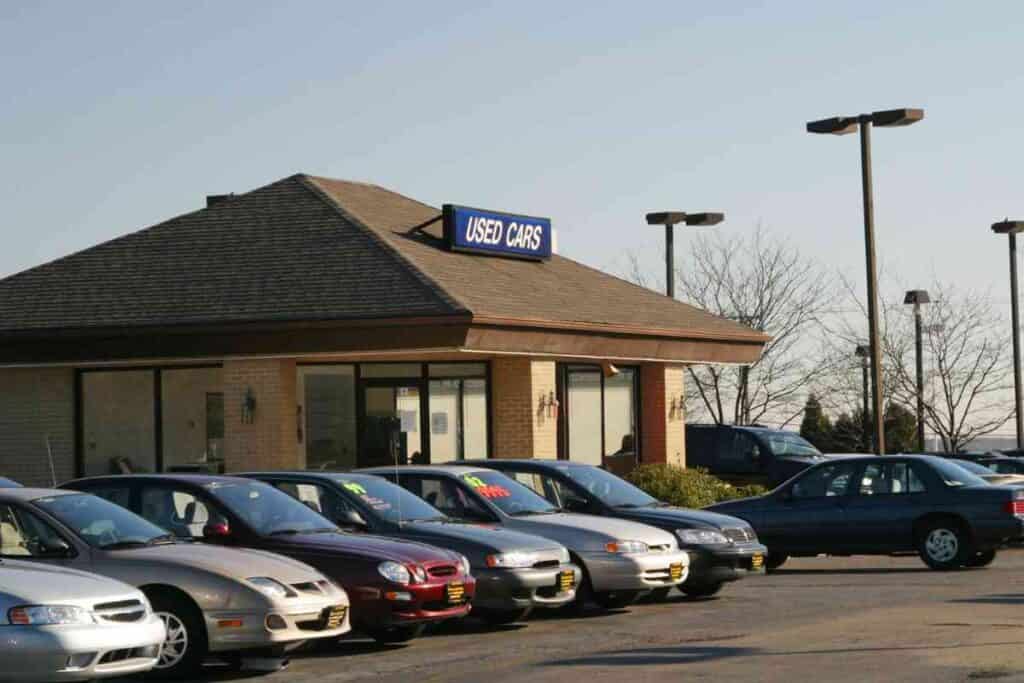How Much Off MSRP Can I Negotiate? How to Outsmart Car Dealers and Get Your Ideal New Car
If you put the title of this article into Google you’ll come up with many articles that will give you all these formulas that are supposed to tell you how much less than the MSRP you should expect to pay for a brand new car, truck, or SUV to get a good deal. While those other articles are fairly reasonable in some of their assumptions about new car discounts, the auto market is a lot more fluid than those formulas would lead you to believe.

How Much Less Than MSRP is a Good Deal on a New Car?
The only fool-proof way of knowing how much less than the MSRP you should be paying for a new car is to get several quotes from different dealers at the same time. The quotes have to be for the exact same vehicle, and they should all be based on the same intended purchase date. It really is that simple, and the more quotes you get, the more certain you can be of what the lowest price for that vehicle is at the moment.
The price a dealer quotes for a vehicle to be delivered in the current month could be very different from the price they would quote for the exact same vehicle for delivery next month.

What exactly is an MSRP?
MSRP stands for Manufacturer Suggested Retail Price, which is the retail price the manufacturer believes the product should be sold to customers for. In the case of new cars, trucks, SUVs and other vehicles, the MSRP is the price that will be used in official advertising, brochures and on manufacturer and dealership websites.
Car dealers are not forced to sell new vehicles for the full MSRP (or sticker price), and a lot of the time, the customer will be able to buy the vehicle for less. The amount of money less than the MSRP the customer manages to negotiate is called the discount, but there can be many forces at play when it comes to determining how much discount is available on a new vehicle at a particular time.
Should you ever pay MSRP for a new car?
A lot of people are convinced that you should never pay the sticker price or MSRP for a new car, but there are several circumstances where a discount may not be available or appropriate and you’ll have to pay the full MSRP if you really want to buy that car at that time.
If demand for the car you want to buy is outstripping supply for some reason, the dealer will probably stick to the full MSRP, and why wouldn’t they? If ten people want to buy a particular new car but the dealer only has two of them to sell, why would they reduce their profits by discounting them and making less money?
If they only have two cars and ten people want to buy them you can be pretty sure that at least two of those ten people will be prepared to pay full price to get theirs.
This happened to me when the Range Rover Sport was launched back in 2005. Dealerships had waiting lists for the RRS and they were actually changing hands in the used market for more than the MSRP.
Speculators had got orders for the cars in early and they had buyers lined up for them who didn’t want to wait until their order could eventually be fulfilled. The speculators would come and buy them at full price and drive them straight from the dealership to the person they’d got lined up to sell them to for thousands of dollars more.
Despite it being common knowledge at the time that there was a waiting list for the new Range Rover Sport, I still had customers coming in to buy them who got quite irate when they were quoted the full MSRP and we refused to offer a discount.
Some people genuinely believe that a discount is some sort of God-given right when you go to buy a new car, but a discount is entirely discretionary and a dealer is entirely within their rights to charge full price.
If you want to know how much dealerships make on the sale of a new or a used car, I cover the subject in some detail in this article. You might be surprised at just how little profit there is in a new car for the dealer, especially after giving a discount.

Is 10% off MSRP a good deal?
A discount of 10% off MSRP is a good deal, but only as long as you can’t get a bigger discount somewhere else. If you walk into your local dealer and negotiate 10% off the sticker price of a new car, how do you know that’s a good deal or not without some sort of reference?
As I said at the start of this article, plenty of other online resources you’ll find on the subject will tell you how much discount constitutes a good deal on a new car, but almost all of the time their conclusions are based purely on the average new car profit margin.
If a dealer sells a brand new car at the MSRP they’ll probably have a margin of somewhere between 9 and 14 percent. As you’ll see in my other article, not all of that margin is even guaranteed to the dealer. Some can be reliant on the dealership meeting other franchise criteria before it’s released to them.
If a vehicle is in big demand then a discount of 2% might be sensational, but sometimes new vehicles could be being sold with as much as 20% off if there is additional financial support coming from somewhere to subsidize the sale.
Let’s say you go to that local dealership and get that 10% discount on your new car and you’re very pleased with it because you know that’s probably most of the profit the dealer has to play with. How do you know another dealership in another city isn’t close to hitting a sales target that gets them an extra 5% for each car sold that month from the manufacturer?
If the vehicle has an MSRP of $40,000, that’s an extra $2,000 per vehicle, and what if the dealership’s target is to hit 20 units by the end of the month? Hitting that target would be worth $40,000 of additional profit for the dealership on top of whatever they make in the 20 units sold.
If the dealer had sold 19 units and one more was needed to hit the target and get the extra $40k profit, how much more discount than 10% do you think you could negotiate on car number 20?
In those circumstances, would you still think the 10% discount you got from your local dealership was a good deal? You might have gotten a 20% discount or even more at the other dealership, but the only way you’d ever know if a bigger discount was available is if you’d got a range of quotes from a range of dealerships.
Ignorance is bliss, or so they say, but it’s only bliss if you remain ignorant. If you find out you could have got your new car for a lot less from somewhere else once you’ve already bought it, you’re no longer ignorant and you certainly won’t be living in bliss anymore either.

Can you ask a dealer for the invoice price?
You can always ask a dealer for the invoice price, which is the price they paid to buy the vehicle from the manufacturer, and some will tell you what the invoice price was to illustrate how little they are making from you and to enlighten you to what a great deal you’re getting.
Of course, in the scenario I just discussed, the invoice price doesn’t tell you about any additional support that might be available to the dealer on that car.
How do you determine the fair price of a new car?
It used to be difficult and often very time-consuming to do proper research to determine the fair price for a new car you were looking to buy, but then along came the internet and all that changed.
Nowadays, all you have to do is sit at your computer or use your smartphone and you can soon find out what the lowest price is you should expect to pay for just about anything, including new cars.
What’s the best place to research new car prices?
If you want my advice, which I hope is the reason you’re reading this in the first place, the best way to find out the lowest price you should expect to pay for a new car is to use a new car quote tool.
All you have to do is put in the car you want along with a few basic contact details and the tool will send those details to appropriate dealers for that car in a pre-defined geographical area.
You’ll then be sent genuine quotes for that car based on your intended purchase date and that will tell you most of what you need to know.
If all the quotes are pretty similar you’ll know you’re probably not going to be able to do much better than that, but if there’s a wide range of prices quoted you then know there’s everything to play for!
If the quotes vary considerably it tells you there’s a lot of competition for your business on that particular model at that particular time, and if one quote is considerably better than the rest then why would you start anywhere else?

How Do You Negotiate a New Car Price?
Negotiating a new car price can be an intimidating process, but with the right approach and preparation, you can secure the best possible deal. Here are some steps to help you effectively negotiate a new car price:
- Research and Preparation: Begin by researching the make and model of the car you’re interested in purchasing. Gather information on the MSRP, invoice price, and any available incentives or rebates. Familiarize yourself with the market value of the car by comparing quotes from multiple dealerships. Online car price comparison tools can be very helpful in this regard.
- Know Your Budget: Determine the maximum amount you’re willing to spend on the car, taking into account factors such as down payment, monthly payments, and interest rates. Stick to your budget during negotiations to avoid overspending.
- Get Pre-Approved for Financing: If you plan to finance your car purchase, get pre-approved for a loan from a bank or credit union before approaching the dealership. This will give you leverage during negotiations, as you’ll know exactly what you can afford and won’t be reliant on dealer financing.
- Focus on the Out-the-Door Price: When negotiating, concentrate on the total out-the-door price of the vehicle, which includes taxes, fees, and any other additional costs. Dealers may try to shift focus to monthly payments, but by keeping the conversation centered on the overall price, you’ll be in a better position to negotiate.
- Be Willing to Walk Away: Don’t be afraid to walk away from a deal if it doesn’t meet your expectations. There are plenty of dealerships and vehicles to choose from, so don’t feel pressured to accept a deal that isn’t in your best interest.
- Time Your Purchase: Dealerships often have sales targets to meet, which can result in better deals for buyers towards the end of the month, quarter, or year. If possible, time your purchase to take advantage of these potential discounts.
- Leverage Competing Quotes: If you have multiple quotes from different dealerships, use them to your advantage during negotiations. Let the dealer know that you have other offers on the table and are willing to go elsewhere if they can’t match or beat the best price you’ve found.
- Be Polite and Professional: During negotiations, maintain a polite and professional demeanor. Being confrontational or aggressive can work against you and hinder your chances of securing a good deal.
- Ask for Extras: If the dealership is unwilling to lower the price further, consider asking for extras, such as an extended warranty, free maintenance, or additional accessories, at no extra cost. This can increase the overall value of the deal.
- Review the Contract Carefully: Once you’ve reached an agreement, review the contract carefully to ensure all negotiated terms are accurately represented, and there are no hidden fees or charges.
By following these steps and being well-prepared, you can successfully negotiate a new car price and drive away with a great deal.
Mastering the Art of Asking for a Lower Price
Learning how to ask for a lower price can be a valuable skill when purchasing a new car. By following these tips, you can confidently negotiate and potentially save a significant amount of money on your next vehicle purchase.
- Do Your Homework: Research the market value of the car you’re interested in buying and gather information on the MSRP, invoice price, and any available rebates or incentives. This information will help you understand what a fair price is and provide a strong foundation for negotiation.
- Be Confident and Assertive: Approach the negotiation process with confidence and assertiveness. This will demonstrate to the salesperson that you’re well-informed and serious about purchasing the vehicle, making them more likely to consider a lower price.
- Use Diplomacy: Be diplomatic and respectful during the negotiation process. Avoid making demands or ultimatums. Instead, express your desire for a lower price while acknowledging the dealer’s perspective.
- Leverage Your Research: Present the information you’ve gathered during your research to support your request for a lower price. Mention any competing offers or lower prices you’ve found at other dealerships.
- Be Willing to Compromise: Negotiating a lower price may involve some give-and-take. Be prepared to compromise on certain aspects, such as accessories or optional features, to achieve the overall price reduction you’re seeking.

Sample Scripts for Asking for a Lower Price:
Script 1: Salesperson: “So, the total price for the car, including taxes and fees, is $35,000.” Buyer: “Thank you for the offer, but based on my research, I’ve found similar models at other dealerships for around $32,000. I really like this car and would prefer to buy it from your dealership, but I would need the price to be more competitive. Is there any possibility of lowering the price to match those other offers?”
Script 2: Salesperson: “The MSRP for this vehicle is $28,000, and with our current promotion, we can bring it down to $27,000.” Buyer: “I appreciate the discount, but I’ve been looking at the invoice price and the market value for this model, and it seems like there’s still some room for negotiation. I’m willing to close the deal today if we can agree on a price closer to $25,000. Can we work something out to reach that price point?”
By using these strategies and sample scripts, you’ll be well-prepared to ask for a lower price when buying a new car, potentially saving yourself thousands of dollars.
MSRP isn’t everything
Despite what a lot of people think, the MSRP of a new vehicle and how much less than that you can get that vehicle for isn’t necessarily the be-all and end-all of buying a new car. Customer service and aftercare can be extremely important when it comes to major purchases like a car, and we haven’t even touched on the subject here of how much you get for your trade-in.
Then there are things like finance deals and add-ons such as GAP insurance which can easily make a dealer more profit than the sale of the new car itself. It’s no good saving $2,000 off the MSRP if you then end up paying $3,000 more in interest on an auto loan than you would have paid if you’d gone to a dealer that wasn’t offering quite as much off the MSRP.
The point I’m trying to make here is that there’s a lot involved with buying a new car, so the price you actually pay for the vehicle compared to the MSRP is only part of the story. However, it’s still an important part of the story and you need to have an accurate idea of what the best price is you should expect to be paying at that time.
Please keep timing in mind though. You could use free quote tools to get the price of a new car and the best quote could be 10% lower than the MSRP. However, if you go to buy the same vehicle in another month or two, you might not be offered anything like the same level of discount.
You might only be offered 2% off right now but if you’re not going to buy for a couple of months you could use the tool again when you do want to buy and be pleasantly surprised with a bigger discount.
It doesn’t cost anything to get the quotes using the tool, but the information it provides is extremely valuable and could end up saving you thousands on your next new vehicle.
Decoding the Out-the-Door Price: What You Need to Know
I prefer to negotiate and buy cars based on what is knowns as “out-the-door pricing.” When purchasing a new car, it’s essential to understand the concept of the “out-the-door price.”
This term refers to the total cost of the vehicle, including all fees, taxes, and additional charges, which can vary significantly from the initially advertised or negotiated price.
In essence, the out-the-door price represents the final amount you’ll pay to take ownership of the car. Here are some key components that make up the out-the-door price:
- Base Price: The base price is the negotiated or agreed-upon price of the vehicle before any additional fees or taxes are added. This amount typically excludes any optional features, accessories, or add-ons.
- Sales Tax: Sales tax is calculated based on the state or jurisdiction where the vehicle is purchased. The percentage charged will vary depending on the location, and this amount will be added to the base price of the car.
- Title and Registration Fees: These fees cover the cost of registering the vehicle in your name and obtaining the title. The amount charged for title and registration fees will vary by state and sometimes even by the local jurisdiction.
- Documentation Fee: The documentation fee, sometimes called the “doc fee,” covers the cost of processing paperwork associated with the vehicle purchase. Dealerships often charge this fee to cover their administrative expenses, and the amount can vary significantly from one dealership to another.
- Destination Fee: A destination fee is a charge imposed by the manufacturer to cover the cost of transporting the vehicle from the factory to the dealership. This fee is typically non-negotiable and is passed on to the buyer.
- Optional Features and Add-ons: Any optional features, accessories, or add-ons you choose to include with your vehicle purchase will also be factored into the out-the-door price. These might include extended warranties, paint protection, or upgraded sound systems, among others.
By understanding the various components that make up the out-the-door price, you can be better prepared to evaluate the true cost of a vehicle and make a more informed decision when purchasing a new car.
Related Car Buying Articles
Discover the insider secrets to car buying success – don’t miss our comprehensive articles on scoring the best deals and navigating the world of new and used cars like a pro!
- Car Reliability Ratings: A Comprehensive Guide For Car Shoppers
- Used Car Warranty Options: A Comprehensive Guide
- 7 Common Scams When Buying A Used Car: How To Avoid Them
- Best Time To Buy A Used Car: Tips And Tricks
- Test Driving A Used Car: Top Tips For A Successful Experience
- VIN Vehicle History Reports: CarFax Vs AutoCheck
- How To Find Quality Used Cars For Sale Near Me: A Comprehensive Guide
Frequently Asked Questions
Q: Can you negotiate MSRP?
A: Yes, you can negotiate the MSRP (Manufacturer Suggested Retail Price) of a new car. Dealerships often sell vehicles at a discount from the MSRP, and the amount can vary depending on factors such as demand, dealership targets, and manufacturer incentives.
Q: What percentage off MSRP can I negotiate?
A: The percentage off MSRP that you can negotiate depends on the specific vehicle and market conditions. Discounts can range from 2% to 20% or more, so it’s essential to research and compare quotes from multiple dealerships to find the best deal.
Q: Can you ask a dealer for the invoice price?
A: Yes, you can ask a dealer for the invoice price, which is the price they paid the manufacturer for the car. Some dealers may share this information to show how little profit they’re making, but keep in mind that the invoice price might not reflect potential discounts or incentives.
Q: How Much Less Than MSRP is a Good Deal on a New Car?
A: A good deal on a new car is typically one that offers a discount of 10% or more off the MSRP. However, it’s crucial to research and compare quotes from multiple dealerships to ensure you’re getting the best possible deal for your specific situation.
Q: How to negotiate a car price when paying cash?
A: When paying cash, you can still negotiate the car price by focusing on the total cost of the vehicle rather than monthly payments. Be upfront about your intention to pay cash, and compare quotes from multiple dealerships to ensure you’re getting the best possible price.
Q: What does “no haggle pricing” mean?
A: “No haggle pricing” means that the dealership has set a fixed price for the vehicle, and they are not open to negotiation. This pricing strategy is designed to simplify the car-buying process and create a transparent, stress-free experience for the customer.
